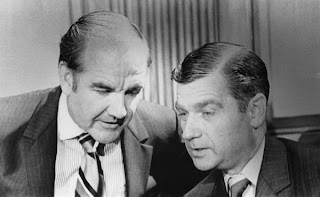George McGovern died on Sunday morning, October 21, 2012. His legacy never recovered from his landslide loss to Richard Nixon in the 1972 presidential election, much to McGovern’s chagrin of course.
As I did research for God and War, I was reminded of another moment, one that made McGovern more than a viable presidential candidate against Nixon. On September 1, 1970, this senator from South Dakota made an impassioned plea in the Senate chamber for a bill co-sponsored by his colleague from Oregon Mark Hatfield to defund the American war in Vietnam and to begin the process of bringing American troops home. McGovern was a decorated of World War II veteran, a bomber pilot who had flown dozens of treacherous and deadly missions over Western Europe. He stood, he told his fellow senators, in opposition to the war in Vietnam, in opposition to the concentration of power in the executive branch that made the war possible, and in opposition to the politics that had condemned thousands of American soldiers to death in Southeast Asia. “Every Senator in this Chamber is partly responsible for sending 50,000 young Americans to an early grave,” McGovern declared. And then in a statement that came to represent the core of his indictment he intoned: “This chamber reeks of blood.”
In his searing speech, he reminded those listening of the “human wreckage at Walter Reed and Bethesda Naval and all across our land–young men without legs, or arms or genitals, or hopes.” Responding directly to the sacralization of the nation in a time of war, McGovern thumped:
There are not many of those blasted and broken boys who think this war is a glorious venture. Do not talk to them about bugging out, or national honor, or courage. It does not take any courage at all for a Congressman or a Senator or a President to wrap himself in the flag and say we are staying in Vietnam, because it is not our blood that is being shed.
McGovern ended his speech with a plea to his colleagues to do their constitutional duty and restrain the nation’s chief executive. The other senators stunned, he returned to his seat in a silent chamber. And then his measure was quickly voted down.
McGovern’s speech continues to stand as a reminder of what moral witness looks like in the politics of war.


One Thought on this Post
S-USIH Comment Policy
We ask that those who participate in the discussions generated in the Comments section do so with the same decorum as they would in any other academic setting or context. Since the USIH bloggers write under our real names, we would prefer that our commenters also identify themselves by their real name. As our primary goal is to stimulate and engage in fruitful and productive discussion, ad hominem attacks (personal or professional), unnecessary insults, and/or mean-spiritedness have no place in the USIH Blog’s Comments section. Therefore, we reserve the right to remove any comments that contain any of the above and/or are not intended to further the discussion of the topic of the post. We welcome suggestions for corrections to any of our posts. As the official blog of the Society of US Intellectual History, we hope to foster a diverse community of scholars and readers who engage with one another in discussions of US intellectual history, broadly understood.
I can’t WAIT to dive into your book, Ray. Yours is next after I finish Appleby’s *The Relentless Revolution*. I want to be prepared to make informed commentary on the forthcoming USIH Round Table on *God and War*. – TL